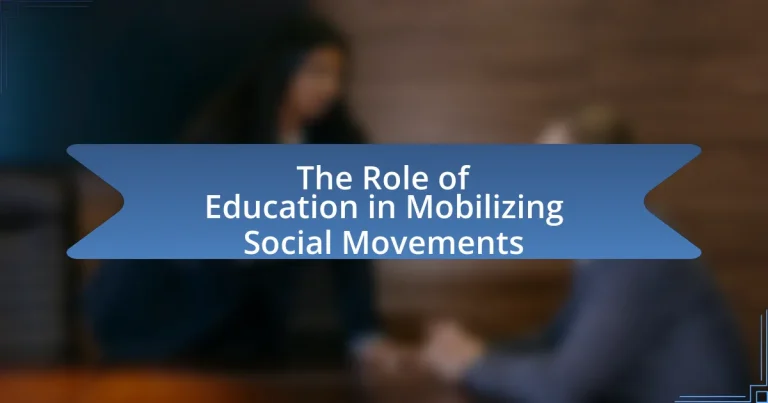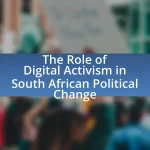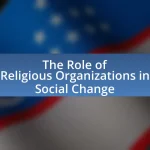The article examines the critical role of education in mobilizing social movements, highlighting how it equips individuals with knowledge and skills necessary for advocacy and civic engagement. It discusses the influence of education on social awareness and activism, emphasizing methods such as experiential learning and critical pedagogy that foster critical consciousness. Historical examples, including the Civil Rights Movement and the Women’s Suffrage Movement, illustrate education’s impact on social change. Additionally, the article explores the dual role of educational institutions in supporting or hindering activism, the intersection of technology with education and social movements, and best practices for designing educational programs that effectively promote social justice and community engagement.
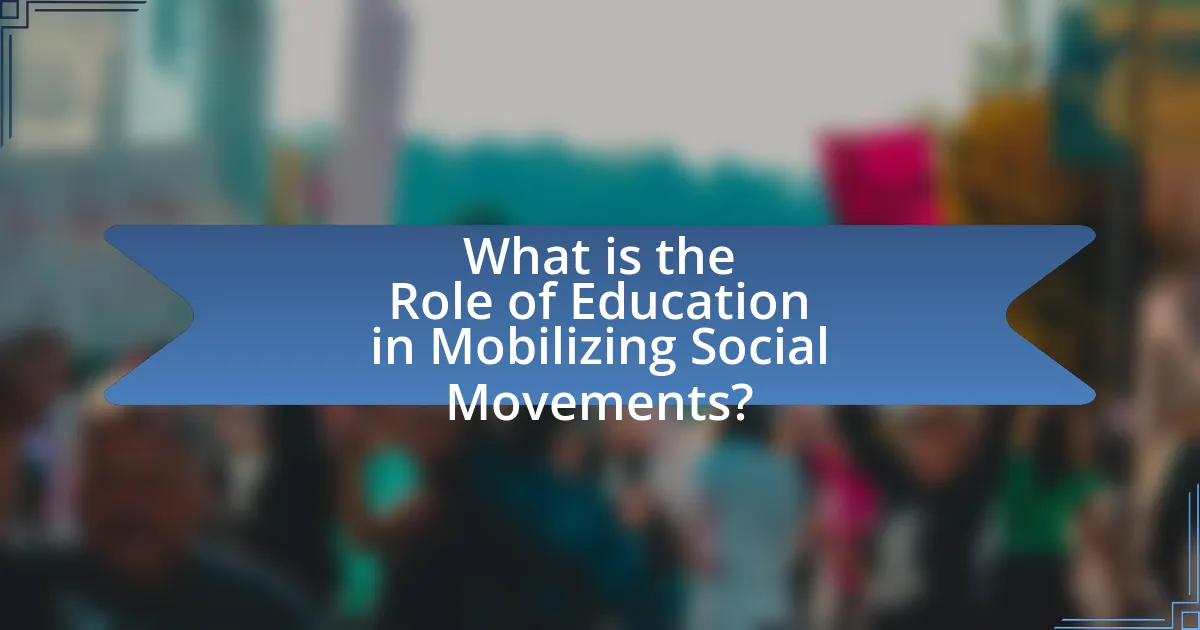
What is the Role of Education in Mobilizing Social Movements?
Education plays a crucial role in mobilizing social movements by equipping individuals with the knowledge and skills necessary to advocate for change. It fosters critical thinking, raises awareness about social injustices, and encourages civic engagement. For instance, historical movements such as the Civil Rights Movement in the United States were significantly influenced by educational initiatives that informed activists about their rights and the importance of collective action. Research indicates that educated individuals are more likely to participate in social movements, as they can articulate their grievances and mobilize others effectively. This correlation is supported by studies showing that higher levels of education correlate with increased activism and participation in democratic processes.
How does education influence social awareness and activism?
Education significantly enhances social awareness and activism by equipping individuals with critical thinking skills and knowledge about societal issues. Through formal and informal education, people learn about historical injustices, social inequalities, and the mechanisms of change, which fosters a sense of responsibility and empowerment. For instance, studies have shown that higher levels of education correlate with increased civic engagement and participation in social movements, as educated individuals are more likely to understand and advocate for their rights and the rights of others. Research by the Pew Research Center indicates that educated individuals are more likely to engage in activism, demonstrating that education serves as a catalyst for informed social action.
What educational methods are most effective in raising social consciousness?
Experiential learning and critical pedagogy are the most effective educational methods in raising social consciousness. Experiential learning engages individuals through direct experience, fostering empathy and understanding of social issues. Critical pedagogy encourages learners to question societal norms and power structures, promoting critical thinking and awareness of social injustices. Research by Paulo Freire emphasizes that education should empower individuals to challenge oppression, illustrating the effectiveness of these methods in cultivating social consciousness.
How does critical pedagogy contribute to social movement mobilization?
Critical pedagogy contributes to social movement mobilization by fostering critical consciousness among individuals, enabling them to recognize and challenge social injustices. This educational approach encourages learners to question dominant narratives and engage in dialogue about power dynamics, which is essential for collective action. For instance, Paulo Freire’s work emphasizes the importance of dialogue and reflection in education, which empowers marginalized groups to articulate their experiences and mobilize for change. Research indicates that educational initiatives grounded in critical pedagogy have successfully led to increased activism and participation in social movements, as seen in various grassroots campaigns advocating for civil rights and environmental justice.
Why is education considered a catalyst for social change?
Education is considered a catalyst for social change because it empowers individuals with knowledge and critical thinking skills, enabling them to challenge existing social norms and injustices. By providing access to information and fostering awareness, education encourages civic engagement and activism, which are essential for driving societal transformation. Historical evidence shows that educated populations are more likely to advocate for reforms; for instance, the civil rights movement in the United States gained momentum through educated leaders who mobilized communities to demand equality and justice. This demonstrates that education not only informs but also inspires collective action, making it a fundamental driver of social change.
What historical examples illustrate education’s role in social movements?
Education has played a crucial role in various social movements throughout history, exemplified by the Civil Rights Movement in the United States. During this period, educational initiatives such as the Freedom Schools were established to empower African Americans with knowledge about their rights and to encourage civic engagement. These schools provided not only academic education but also political education, fostering a sense of agency among students.
Another significant example is the Women’s Suffrage Movement, where education was used to raise awareness about women’s rights and the importance of voting. Organizations like the National American Woman Suffrage Association focused on educating both women and men about gender equality, which helped mobilize support for the suffrage cause.
Additionally, the anti-apartheid movement in South Africa utilized education as a tool for resistance. Activists like Nelson Mandela emphasized the importance of education in raising awareness about racial injustices and mobilizing the population against apartheid policies.
These historical instances illustrate how education has been instrumental in informing, empowering, and mobilizing individuals within social movements, leading to significant societal changes.
How do educational institutions support or hinder social activism?
Educational institutions support social activism by providing platforms for dialogue, fostering critical thinking, and encouraging civic engagement among students. For instance, universities often host workshops, lectures, and events that promote awareness of social issues, enabling students to organize and participate in activism. Conversely, these institutions can hinder social activism through policies that restrict free speech or limit student organizing. A notable example is the implementation of speech codes or administrative barriers that suppress student-led initiatives, as seen in various cases across U.S. campuses where protests were met with administrative pushback. Thus, the role of educational institutions in social activism is dual-faceted, with their influence shaped by institutional policies and cultural contexts.
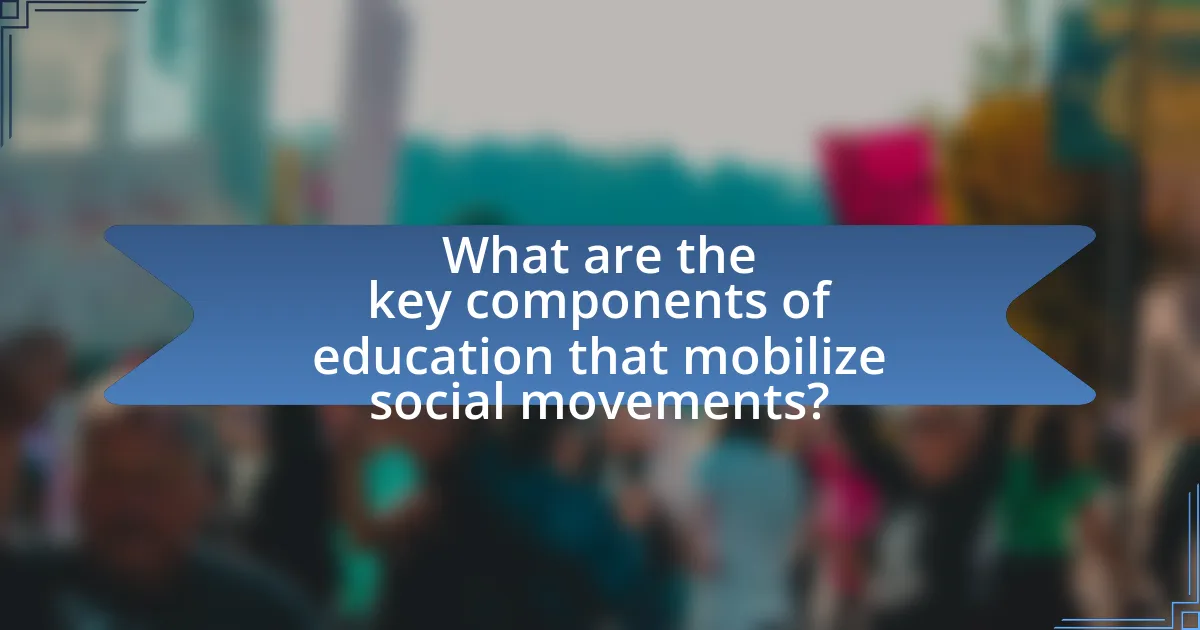
What are the key components of education that mobilize social movements?
The key components of education that mobilize social movements include critical consciousness, access to information, and community engagement. Critical consciousness enables individuals to recognize social injustices and empowers them to take action, as demonstrated by Paulo Freire’s work, which emphasizes the importance of dialogue and reflection in education. Access to information equips individuals with the knowledge necessary to understand their rights and the mechanisms of power, facilitating informed activism. Community engagement fosters solidarity and collective action, as seen in various social movements where educational initiatives have brought people together to advocate for change, such as the Civil Rights Movement in the United States, which utilized educational programs to mobilize communities for social justice.
How do curricula shape the perspectives of future activists?
Curricula shape the perspectives of future activists by providing foundational knowledge, critical thinking skills, and exposure to social justice issues. Educational programs that include topics such as human rights, environmental justice, and civic engagement encourage students to analyze societal structures and recognize the importance of activism. For instance, research by the National Education Association indicates that curricula incorporating social justice themes foster a sense of agency among students, motivating them to engage in activism. Furthermore, experiential learning opportunities, such as service-learning projects, allow students to apply their knowledge in real-world contexts, reinforcing their commitment to social change.
What subjects are most impactful in fostering social justice awareness?
History, sociology, and political science are the subjects most impactful in fostering social justice awareness. History provides context on past injustices and movements, highlighting the struggles and achievements of marginalized groups. Sociology examines social structures, inequalities, and the dynamics of power, enabling students to understand systemic issues. Political science explores governance, policy-making, and civic engagement, equipping individuals with the knowledge to advocate for change. Research indicates that education in these areas significantly enhances critical thinking and empathy, essential for social justice advocacy. For instance, a study by the American Educational Research Association found that students exposed to social justice curricula demonstrated increased awareness and engagement in social issues.
How can experiential learning enhance engagement in social issues?
Experiential learning enhances engagement in social issues by providing individuals with hands-on experiences that foster critical thinking and empathy. This approach allows learners to actively participate in real-world scenarios, which deepens their understanding of social challenges. Research indicates that experiential learning increases retention of information and motivates individuals to take action; for instance, a study by Kolb (1984) highlights that learning through experience leads to greater personal investment in social causes. By engaging directly with communities and issues, participants develop a sense of agency and responsibility, which can drive social change.
What role do educators play in social movement mobilization?
Educators play a crucial role in social movement mobilization by serving as facilitators of critical thinking and awareness among students and communities. They educate individuals about social issues, fostering a sense of agency and encouraging civic engagement. For instance, educators often incorporate social justice themes into their curricula, which can inspire students to participate in movements advocating for change. Research indicates that educational institutions have historically been sites of activism, with educators leading initiatives that address inequality and injustice, such as the Civil Rights Movement, where teachers organized and mobilized communities for social reform.
How can teachers inspire students to participate in activism?
Teachers can inspire students to participate in activism by integrating social justice topics into the curriculum and encouraging critical thinking about societal issues. By discussing real-world problems, such as climate change or inequality, teachers can help students understand the importance of civic engagement. Research shows that students who engage in discussions about social issues are more likely to participate in activism; for example, a study published in the Journal of Educational Psychology found that students exposed to civic education are more likely to vote and engage in community service. Additionally, teachers can facilitate opportunities for students to take action, such as organizing events or participating in community service projects, which further empowers them to become active participants in social change.
What challenges do educators face when promoting social movements?
Educators face significant challenges when promoting social movements, primarily due to institutional resistance, lack of resources, and diverse student perspectives. Institutional resistance often manifests in policies that discourage political activism within educational settings, limiting educators’ ability to engage students in social issues. Additionally, a lack of resources, including funding and training, hampers educators’ efforts to effectively teach about social movements and facilitate discussions. Furthermore, the diverse perspectives of students can lead to conflicts and discomfort in classrooms, making it difficult for educators to create an inclusive environment that encourages open dialogue about sensitive topics. These challenges hinder the ability of educators to mobilize students effectively in support of social movements.
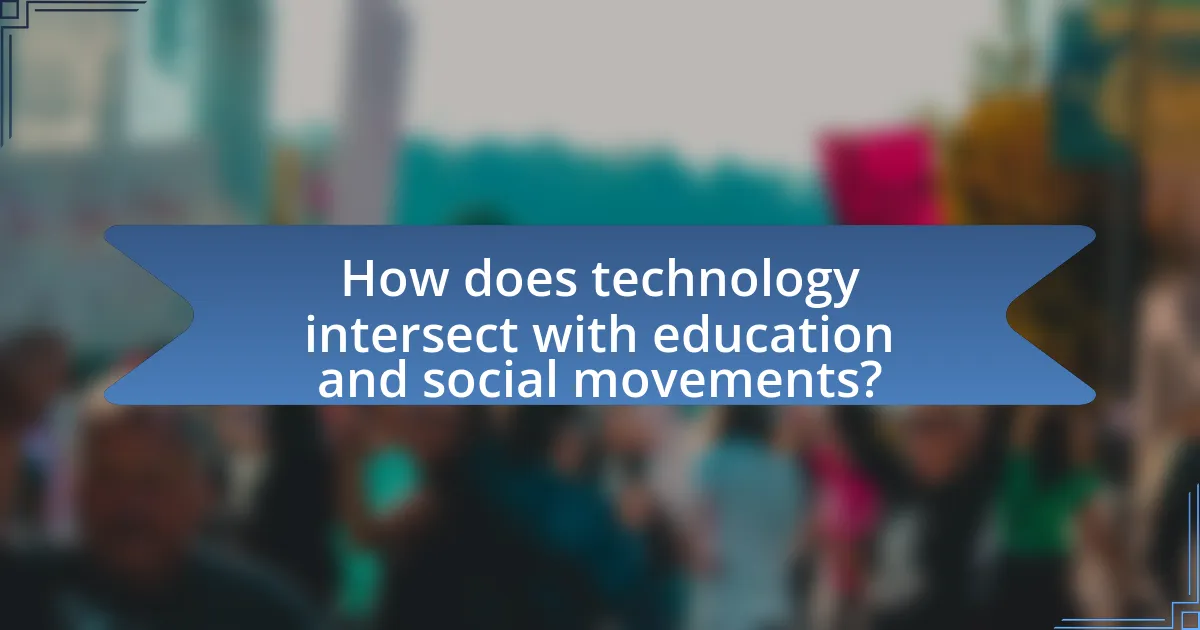
How does technology intersect with education and social movements?
Technology enhances education and amplifies social movements by providing platforms for communication, collaboration, and information dissemination. Online learning tools and social media enable educators and activists to reach wider audiences, share resources, and organize events efficiently. For instance, during the Arab Spring, social media platforms like Twitter and Facebook played crucial roles in mobilizing protests and spreading awareness about educational initiatives. Research by the Pew Research Center indicates that 72% of social media users have engaged with political content, demonstrating technology’s significant impact on civic engagement and education.
What digital tools are effective in mobilizing social movements through education?
Digital tools such as social media platforms, online learning management systems, and mobile applications are effective in mobilizing social movements through education. Social media platforms like Twitter and Facebook facilitate rapid information dissemination and community building, allowing activists to share educational content and organize events. Online learning management systems, such as Moodle and Coursera, provide structured educational resources that can empower individuals with knowledge about social issues. Mobile applications, like WhatsApp and Signal, enable real-time communication and coordination among activists, enhancing grassroots mobilization efforts. Research indicates that these digital tools have significantly increased engagement and participation in social movements, exemplified by the Arab Spring, where social media played a crucial role in organizing protests and spreading awareness.
How do social media platforms facilitate educational outreach for activism?
Social media platforms facilitate educational outreach for activism by providing accessible channels for information dissemination and community engagement. These platforms enable activists to share educational content, such as articles, videos, and infographics, which raise awareness about social issues and mobilize support. For instance, during the Black Lives Matter movement, social media was instrumental in spreading educational resources about systemic racism and police brutality, reaching millions globally. Research indicates that 70% of social media users have engaged with content related to social justice, demonstrating the effectiveness of these platforms in fostering informed activism.
What are the risks of misinformation in educational contexts related to social movements?
Misinformation in educational contexts related to social movements poses significant risks, including the distortion of historical facts, the promotion of harmful stereotypes, and the undermining of legitimate activism. When educational materials contain inaccuracies, they can mislead students about the nature and goals of social movements, resulting in a skewed understanding of critical social issues. For instance, studies have shown that misinformation can lead to decreased public support for movements, as seen in the backlash against the Black Lives Matter movement, where misrepresented narratives influenced public perception negatively. Furthermore, misinformation can foster division and conflict within communities, as individuals may act on false premises, leading to polarization rather than constructive dialogue.
How can educational programs be designed to effectively support social movements?
Educational programs can be designed to effectively support social movements by integrating critical pedagogy, which encourages learners to question societal norms and engage in activism. This approach fosters critical thinking and empowers individuals to understand and challenge systemic injustices, as evidenced by the work of Paulo Freire, who emphasized dialogue and reflection in education to promote social change. Additionally, programs should include experiential learning opportunities, such as community service and activism projects, which have been shown to enhance civic engagement and solidarity among participants. Research indicates that educational initiatives that incorporate these elements can lead to increased awareness and participation in social movements, as demonstrated by the success of programs like the Youth Activism Project, which effectively mobilized young people around social issues.
What best practices should be implemented in educational curricula for activism?
Educational curricula for activism should incorporate experiential learning, critical thinking, and interdisciplinary approaches. Experiential learning allows students to engage in real-world activism through projects and community involvement, fostering practical skills and a deeper understanding of social issues. Critical thinking encourages students to analyze and question societal norms, empowering them to develop informed opinions and solutions. Interdisciplinary approaches integrate various subjects, such as history, sociology, and environmental science, providing a comprehensive understanding of activism’s context and impact. Research indicates that curricula emphasizing these practices enhance student engagement and effectiveness in social movements, as seen in programs like the Youth Activism Project, which demonstrated increased civic participation among participants.
How can community partnerships enhance educational efforts in social movements?
Community partnerships can enhance educational efforts in social movements by providing resources, expertise, and local knowledge that strengthen outreach and engagement. These collaborations allow for the sharing of diverse perspectives, which enriches educational content and makes it more relevant to the community’s specific needs. For instance, partnerships with local organizations can facilitate workshops and training sessions that empower individuals with the skills necessary for activism. Research indicates that community-based education initiatives, such as those documented in the “Community-Based Participatory Research” by Israel et al. (2005), demonstrate improved community involvement and knowledge retention, thereby fostering a more informed and active citizenry in social movements.
What practical steps can individuals take to leverage education for social change?
Individuals can leverage education for social change by actively engaging in community-based learning initiatives. These initiatives can include organizing workshops that address social issues, such as inequality or environmental sustainability, which empower participants with knowledge and skills to advocate for change. Research indicates that education can increase civic engagement; for example, a study by the National Conference on Citizenship found that individuals with higher education levels are more likely to participate in community service and advocacy efforts. Additionally, individuals can utilize online platforms to share educational resources and mobilize others around social causes, thereby expanding the reach and impact of their efforts.
